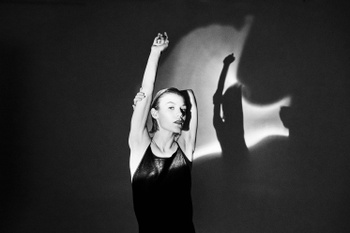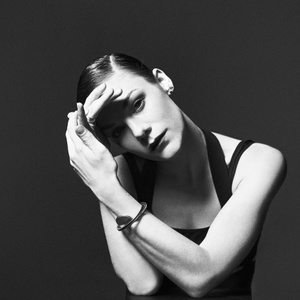Lacuna is the record on which Trixie Whitley comes to terms with herself and with the world around her. “I haven’t felt so comfortable with myself since I was a teenager.”
© Kylie Coutts
| Tribe Whitley: "My vulnerability is my strenght"
Also read: Trixie Whitley op bezoek bij BRUZZ
On her third album, everything seems to have come together for the American-Ghent singer. Influenced by personal and global crises, Lacuna is Trixie Whitley’s first real statement and follows her breakthrough records Fourth Corner (2013) and Porta Bohemica (2015). The hardened political and social climate, the many #MeToo testimonies, including her own, and new life helped her to get things in order. The fact that the daughter of Hélène Gevaert and the late American singer-songwriter Chris Whitley – between whom she commuted for her entire youth – has herself become a mother to her daughter Phoenix, finally gave her the extra push to start with a clean slate. “If I were asked to function in a system that does not correspond to my personal values, but which would decide my name, my face, and my brand, I would think it was hypocritical and even criminal, not only with respect to myself, but also with respect to my daughter.”
Her regained freedom has not only filled her with self-assurance. The young girl who as a teenager started dancing with Sidi Larbi Cherkaoui is now again appearing in dance productions, and that seems to be completely aligned with Lacuna, which sounds much more physical than its predecessors.
We didn’t only hear your music in TrapTown last year. We also saw video footage of you running around in the labyrinth that was specially made for the multimedia production by Wim Vandekeybus. Did you think: finally back home?
Trixie Whitley: It’s true that I love being challenged, and just like Wim, I don’t like playing it safe. To him, it is simply obvious that you should submit to a certain kind of natural chaos. If you don’t take any risks, you will miss many opportunities. Along with his drive, what I share with Wim is primarily the sense that life is a great voyage of discovery. Institutional or classical forms of expression have always been too restrictive for me. I didn’t want to put everything in one single box: choose only one instrument, or only sing. Since I was a child, I have been interested in a much broader palette. As a child in New York, I danced through life. I don’t mean by that that I imagined I was a ballerina, but that I preferred to use all of my senses. I am happiest in environments where diversity is not a meaningless concept. It stimulates my curiosity. I live with my feelers. As far as I am concerned, feelings are also facts, and language is too limited to express them. It was with Cherkaoui that I first realized that I couldn’t choose just one outlet, but that I had to develop my own language. At the time it was very vague and abstract. It was only while making Lacuna that I felt my musical, intuitive, physical, and intellectual needs becoming one. If the first ten years of my music career were focused on developing my skills as a songwriter and on expanding my vocabulary, in this stage of my life I want to rediscover the physical. Since I left school at seventeen (to move from Ghent to New York, tp), I have continued to learn new things autodidactically, and I started creating my own School of Life.

© Kylie Coutts
To what does the lacuna in the title of the new album refer?
Whitley: To everything that has not yet been expressed in our society, and the emptiness that it leaves behind. The paradox is of course that it is precisely people like Trump who open the gates and let the puss flow freely from the gaping wound. In “Dandy”, I wonder how misogynists like him come to power. It is of course related to populism, manipulation, and marketing. I had very ambiguous feelings when I took part in the Women’s March the day after his inauguration. There was a sense of hope and solidarity, but at the same time, I felt very vulnerable because it reminded me of my own traumas. I was overcome by a certain sadness. That is presumably the consequence of the mourning process, which many women were finally able to begin after long periods of bottled-up, unexpressed inequality.
When I’m working, I have a tendency to be very obsessive. I forget to eat and to clean – almost like a bachelor!

You were only able to share your own #MeToo story via Instagram in the current circumstances?
Whitley: It wasn’t calculated, but was the result of an instinctive need. Over the past two years, I have had days that were so dark that I couldn’t see any reason to keep fighting. The only way to get out of it was to look for ways of letting go of all the toxic things that were (grabs her throat) crushing and destroying me. And to say: tomorrow is a new day. I had to make that choice for my daughter too. Because of my wounds and traumas, I had never really loved myself, and was always apologizing for existing. But that is not the example that you want to set for a child. You don’t want your child to say: you can just repress me and make me smaller than I am because I am not worthy of being loved. I am realistic enough to realize that the world is not as ideal as I would like to imagine it, but if I were no longer to strive for that idealized image, what would I be doing here?
How are you now?
Whitley: I haven’t felt so comfortable with myself since I was a teenager. After my daughter was born, I realized much more that I have always struggled with my past and where I come from. Shit, I think, I have this genetic material, but there is so much more. It’s nature and nurture, not nature or nurture. Everything’s connected, and it’s all interdependent. We can’t do everything by ourselves. We need each other. That’s why I think it is so strange that people have difficulty showing their vulnerability, which they still think of as a weakness. I have always believed that my vulnerability is also my strength, and that my strength is very vulnerable. The two will always be connected. It is related to wholesomeness. I want to be a wholesome human being. But on the other hand, when I’m working, I have a tendency to be very obsessive. I forget to eat and to clean, and I become almost like a bachelor. (Laughs) So now I try to organize my life so that it becomes one with who I am: an emotional person who functions with her feelers, and whose sensors are both in her brain and in her toes. The most wholesome way I can live and communicate is by respecting that.
> Trixie Whitley. 28 & 29/5, 20.00, Ancienne Belgique
Read more about: Muziek
Fijn dat je wil reageren. Wie reageert, gaat akkoord met onze huisregels. Hoe reageren via Disqus? Een woordje uitleg.